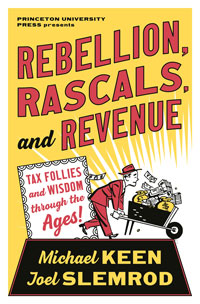Rebellion, Rascals, and Revenue: Tax Follies and Wisdom through the Ages

Michael Keen and Joel Slemrod
Princeton University Press, Princeton, NJ, 2021, 511pp., $29.95
Tax history resembles the warehouse in the final scene of the movie Raiders of the Lost Ark—an enormous, poorly lit jumble of unlabeled boxes, one of which may be hiding the answer to all the world’s tax problems. This new book by two leading tax analysts turns up the lights, organizes many of the boxes in an enlightening way, and presents the results with a style and flair that make the subject not only understandable but—and this may come as a surprise to many—actually fun to read. The authors may not have found the answer, but even the most experienced reader can learn something from this lively and informative book.
This is a rare find that can and should be read and enjoyed not only by experts but by anyone who has ever had questions about taxation. As Michael Keen (of the IMF) and Joel Slemrod (University of Michigan) show, “taxes are us” in the sense that everywhere and always, they change and develop with the times.
Although countries’ tax practices are usually shaped more by specific and immediate concerns than by higher motives, tax history nonetheless offers some wisdom and displays some follies we should avoid.
Every chapter is good reading for everyone and worth at least a skim for even the most knowledgeable. Chapter 2, for example, is an impressive capsule review of the history of taxation, dating back to ancient Egypt, China, and Greece. Chapter 4’s title—“Fair Enough”—tells the story of what tax equity is all about. The discussion of who really pays taxes in Chapter 7—“Stick or Shift,” another wonderful title—demonstrates that tax analysts may have learned much about tax economics, but they still fall short when it comes to the policy implications of their work. Chapter 12 (with yet another great title: “Vlad the Impaler and the Gentle Art of Tax Collection”) is an excellent introduction to the important and still unduly neglected subject of tax administration. The discussion of this issue is generally excellent, although it does not raise the question of why China’s tax system, which seems to be administered very differently than the book suggests as preferable, works as well as it does.
Finally, Chapter 11 is a masterful review—if not as easy a read—of the international dimension of taxation. The chapter concludes that problems in this area can be resolved only if countries “…pool and exercise the collective sovereignty that they still possess.” The authors return to this theme in the concluding chapter, suggesting that many current tax problems can be resolved only by “deeper international cooperation.” I am less optimistic about the outcome of ongoing international discussions of taxation than the authors seem to be. But they make a strong case for their view, and in this, as in all respects, the book is an excellent read.
Opinions expressed in articles and other materials are those of the authors; they do not necessarily represent the views of the IMF and its Executive Board, or IMF policy.









